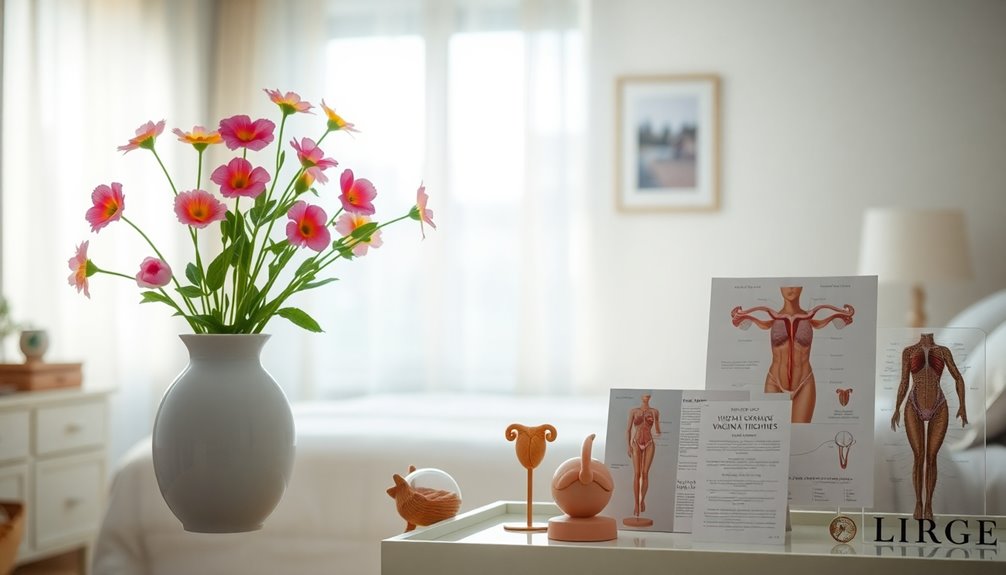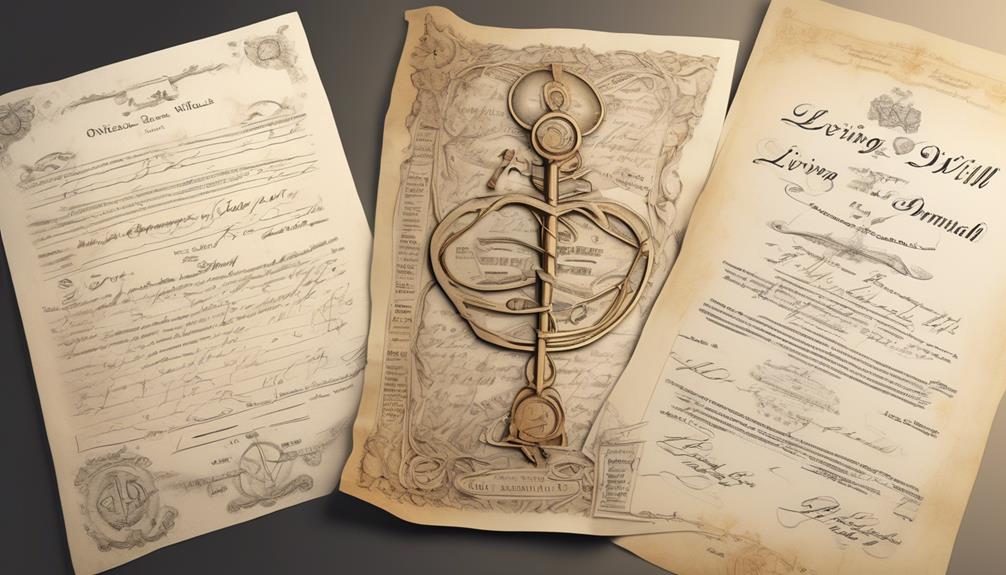When it comes to vaginal tightness, there are many myths to sift through. First, regular sex doesn't permanently loosen your vagina; it stretches, but the muscles generally return to their original shape. Factors like hormonal changes and childbirth can affect elasticity, but most women see a return to tightness over time. Kegel exercises and interventions like vaginal weights can enhance muscle strength. Remember, it's essential to communicate openly about sexual health and preferences. By gaining a deeper understanding of these topics, you'll better appreciate the truth behind vaginal tightness and dispel the myths surrounding it.
Key Takeaways
- Vaginal tightness varies due to hormonal changes, childbirth, and individual genetics, contradicting the myth that sexual activity permanently loosens the vagina.
- The vagina is elastic and can return to its original shape after intercourse, dispelling concerns about long-term changes in tightness.
- Regular pelvic floor exercises, like Kegels, can strengthen vaginal muscles, enhancing tightness regardless of age or sexual history.
- Myths about the hymen and vaginal tightness create stigma; understanding anatomy and body uniqueness fosters healthier discussions about women's health.
- Consulting healthcare professionals about treatment options, such as vaginal rejuvenation or surgical procedures, is essential for addressing concerns about tightness.
Understanding Vaginal Anatomy
Understanding vaginal anatomy is key to dispelling common myths about the female body. The vagina, a muscular canal, typically measures between 3 to 4 inches in depth, but its elastic walls allow it to stretch during intercourse and childbirth. This elasticity is essential for accommodating various activities, yet it can vary from person to person due to factors like age and hormonal changes.
The vagina consists of several structures, including the vaginal canal, cervix, and vulva, each playing a distinct role in the reproductive system. Natural lubrication produced by vaginal glands enhances comfort, promoting overall vaginal health.
It's important to recognize that vaginal muscles and pelvic floor muscles work together to support the vagina. These muscles can strengthen or weaken over time, influencing how the vagina changes after childbirth or during different life stages.
Understanding these aspects helps you appreciate your body better and realize that myths about looseness often stem from misinformation. By educating yourself about vaginal anatomy, you're empowered to embrace the natural variations in your body without shame or confusion.
Factors Affecting Vaginal Tightness

Various factors can influence vaginal tightness, and recognizing these can help dispel myths surrounding the topic. Understanding these influences can empower you to maintain or improve your vaginal health.
| Factor | Impact on Vaginal Tightness |
|---|---|
| Hormonal Fluctuations | Affect tone and lubrication during cycles |
| Childbirth | Vaginal delivery can stretch muscles |
| Pelvic Floor Exercises | Strengthen muscles, enhancing tightness |
| Genetics | Individual differences in elasticity |
As you age, decreased elasticity often occurs, especially as you approach menopause due to lower estrogen levels. Additionally, childbirth can stretch the vaginal muscles, but many women find they regain their pre-pregnancy tightness over time. Hormonal fluctuations throughout the menstrual cycle and during menopause can also play a significant role, affecting both tone and lubrication.
Lifestyle factors, including your activity level and weight, are vital for maintaining vaginal tightness. Finally, genetics contribute to natural differences in vaginal structures, meaning some women may have tighter or looser vaginal muscles than others. Understanding these factors can help you take proactive steps towards your vaginal health.
Myths About Vaginal Looseness

Many women encounter myths about vaginal looseness that can lead to unnecessary anxiety and misunderstanding. One prevalent myth is that regular sexual activity causes permanent vaginal loosening. In reality, your vaginal muscles return to their original shape after intercourse. Vaginal elasticity is influenced by factors like age, childbirth, and hormonal changes—not how often you engage in sexual activity.
Another common misconception involves the hymen. Many believe its status determines tightness or sexual experience, but the hymen doesn't fully cover the vaginal opening and shouldn't be seen as a measure of vaginal health.
After childbirth, it's normal to experience temporary changes in vaginal tightness, but the vagina typically regains its elasticity over time.
These myths often stem from societal pressures and can create unnecessary stigma around women’s health and sexuality. It’s essential to challenge these misconceptions and recognize that every woman’s body is unique. By fostering open discussions about women’s health, we can break down these barriers and promote a healthier understanding of sexuality. This inclusive approach not only empowers women but also encourages partners to engage with one another in a more compassionate manner, ultimately finding common ground in intimacy. Celebrating the diversity of women’s experiences will lead to stronger relationships and a more supportive community.
Embracing the truth about vaginal looseness can help foster a healthier understanding of your pelvic floor and overall well-being. Remember, your body is resilient, and any concerns about vaginal tightening should be approached with accurate information and support.
Treatment Options for Tightening

When it comes to tightening the pelvic floor, several effective treatment options can help you regain strength and confidence. These methods focus on enhancing your pelvic floor muscles, ensuring improved tone and function over time.
- Kegel exercises: Regularly practice sets of 10 repetitions, three times a day for at least six months to see significant improvements.
- Vaginal weights: These specialized devices provide resistance during exercises, helping you strengthen your pelvic floor muscles effectively.
- Vaginal rejuvenation: Procedures like ThermiVA utilize laser technology to tighten vaginal tissues and enhance lubrication, suitable for women of all ages.
- Surgical options: If you're dealing with pelvic organ prolapse or seeking more immediate results, surgical procedures like vaginoplasty and perineoplasty can restore vaginal tightness, typically performed as outpatient care.
Before starting any treatment, it's crucial to consult with a healthcare professional. They can help determine which options are appropriate for your individual health needs and conditions.
With the right approach, you can successfully tighten your pelvic floor and feel more confident in your body.
Importance of Communication and Health

Effective communication plays a pivotal role in enhancing sexual health and overall well-being. When you openly discuss preferences with your partner, you create an environment that fosters mutual satisfaction.
It's crucial to talk about vaginal health, including any unusual symptoms like discharge or odor, as these can indicate underlying issues. Early detection through conversations and regular gynecological check-ups can greatly improve your health outcomes.
Misconceptions about vaginal tightness often arise from societal pressures, leading to unnecessary anxiety about vaginal elasticity. Understanding that each individual's body is unique helps dispel these myths and encourages healthier attitudes toward body image.
Remember, your comfort and preferences matter, and sharing these with your partner can enhance your sexual experiences.
Moreover, being aware of your vaginal health not only empowers you but also promotes a supportive dialogue about sexual health. It's important to educate yourself and break the stigma surrounding these discussions. Additionally, discussing financial planning during and after a divorce can significantly impact your overall well-being and ease the transition to post-divorce life.
Frequently Asked Questions
Does Vaginal Tightness Affect Sexual Pleasure for Both Partners?
Vaginal tightness can influence sexual pleasure, but it's not the only factor. Both partners experience pleasure through intimacy, connection, and communication. Focusing on these aspects often leads to a more fulfilling sexual experience for everyone involved.
Can Pelvic Floor Exercises Help With Vaginal Tightness?
Imagine Sarah, who struggled with vaginal tightness. By incorporating pelvic floor exercises like Kegels into her routine, she noticed increased strength and control, proving these exercises can indeed help improve vaginal tightness for many women.
Are There Specific Foods That Promote Vaginal Health?
Yes, certain foods can boost vaginal health. Incorporate yogurt, leafy greens, and berries into your diet. They promote good bacteria, enhance hydration, and support overall hormonal balance, which can contribute to a healthier vaginal environment.
How Does Hormonal Birth Control Impact Vaginal Elasticity?
Hormonal birth control can affect your vaginal elasticity. It often alters hormone levels, which may lead to changes in tissue flexibility. If you notice significant changes, consult your healthcare provider for personalized advice and solutions.
Is There a Difference Between Vaginal Looseness and Pelvic Floor Dysfunction?
Yes, there's a difference. Vaginal looseness often relates to elasticity, while pelvic floor dysfunction involves muscle strength and control. You should consult a healthcare professional to discuss any concerns about your pelvic health and function.
Conclusion
So, while you might think that a "loose pussy" is a big deal, it turns out it's more about myths than reality. Your vagina's elasticity is a natural part of life, and it doesn't define your worth or desirability. Ironically, the obsession with tightness often overshadows the true importance of connection and communication in intimacy. Embrace your body and remember, it's not about how tight it is, but how well you connect with your partner.









